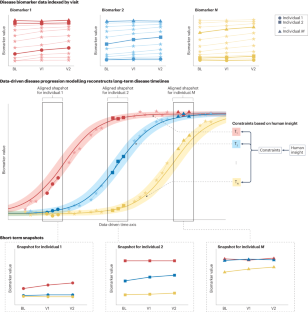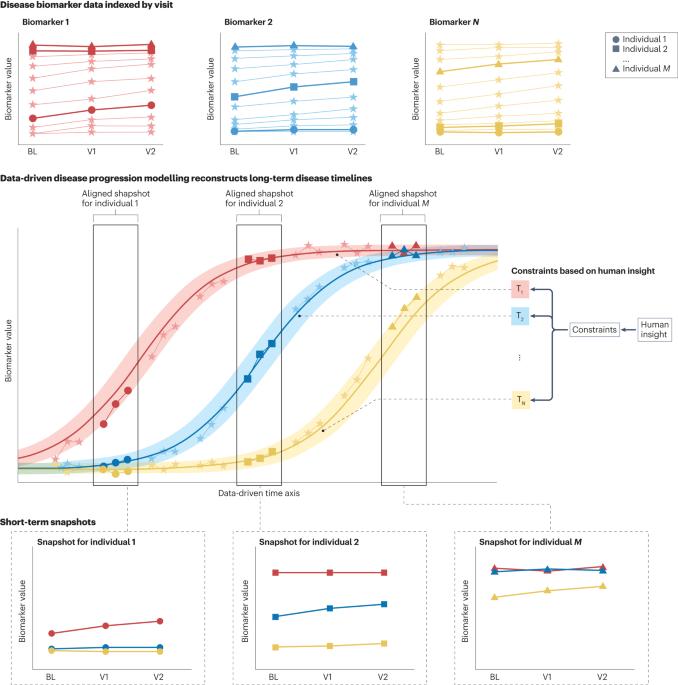神经退行性疾病进展的数据驱动建模:跳出黑箱思维
IF 28.7
1区 医学
Q1 NEUROSCIENCES
引用次数: 0
摘要
数据驱动的疾病进展模型是一套新兴的计算工具,可重建长期慢性疾病的疾病时间线,为疾病进程及其内在机制提供独特的见解。这类方法将人类的先验知识和假设与大规模数据处理和参数估计相结合,从短期数据中推断出长期疾病轨迹。与 "黑盒子 "机器学习工具相比,数据驱动的疾病进展模型通常需要的数据更少,而且本身具有可解释性,因此除了能进行分类、预测和分层外,还能帮助理解疾病。在这篇综述中,我们将把数据驱动型疾病进展模型的现状置于一个总体框架中,并讨论与构建静态疾病概况的更广泛的机器学习工具相比,数据驱动型疾病进展模型在构建疾病时间轴方面更强的实用性。我们回顾了这些模型在多种神经退行性疾病(尤其是阿尔茨海默病)中的应用,如确定疾病生物标记物的时间轨迹、测试疾病机制假设和发现疾病亚型。我们概述了技术开发的关键领域,并将其转化为更广泛的神经科学和非神经科学应用。最后,我们讨论了将疾病进展模型融入临床实践和试验环境的潜在途径和障碍。本文章由计算机程序翻译,如有差异,请以英文原文为准。


Data-driven modelling of neurodegenerative disease progression: thinking outside the black box
Data-driven disease progression models are an emerging set of computational tools that reconstruct disease timelines for long-term chronic diseases, providing unique insights into disease processes and their underlying mechanisms. Such methods combine a priori human knowledge and assumptions with large-scale data processing and parameter estimation to infer long-term disease trajectories from short-term data. In contrast to ‘black box’ machine learning tools, data-driven disease progression models typically require fewer data and are inherently interpretable, thereby aiding disease understanding in addition to enabling classification, prediction and stratification. In this Review, we place the current landscape of data-driven disease progression models in a general framework and discuss their enhanced utility for constructing a disease timeline compared with wider machine learning tools that construct static disease profiles. We review the insights they have enabled across multiple neurodegenerative diseases, notably Alzheimer disease, for applications such as determining temporal trajectories of disease biomarkers, testing hypotheses about disease mechanisms and uncovering disease subtypes. We outline key areas for technological development and translation to a broader range of neuroscience and non-neuroscience applications. Finally, we discuss potential pathways and barriers to integrating disease progression models into clinical practice and trial settings. Data-driven disease progression models are computational tools that infer long-term disease timelines from short-term biomarker data and may provide insights into disease processes. In this Review, Young, Oxtoby et al. provide an overview of such models, with a focus on how they have been used in the context of neurodegenerative diseases, notably Alzheimer disease.
求助全文
通过发布文献求助,成功后即可免费获取论文全文。
去求助
来源期刊

Nature Reviews Neuroscience
NEUROSCIENCES-
自引率
0.60%
发文量
104
期刊介绍:
Nature Reviews Neuroscience is a multidisciplinary journal that covers various fields within neuroscience, aiming to offer a comprehensive understanding of the structure and function of the central nervous system. Advances in molecular, developmental, and cognitive neuroscience, facilitated by powerful experimental techniques and theoretical approaches, have made enduring neurobiological questions more accessible. Nature Reviews Neuroscience serves as a reliable and accessible resource, addressing the breadth and depth of modern neuroscience. It acts as an authoritative and engaging reference for scientists interested in all aspects of neuroscience.
 求助内容:
求助内容: 应助结果提醒方式:
应助结果提醒方式:


